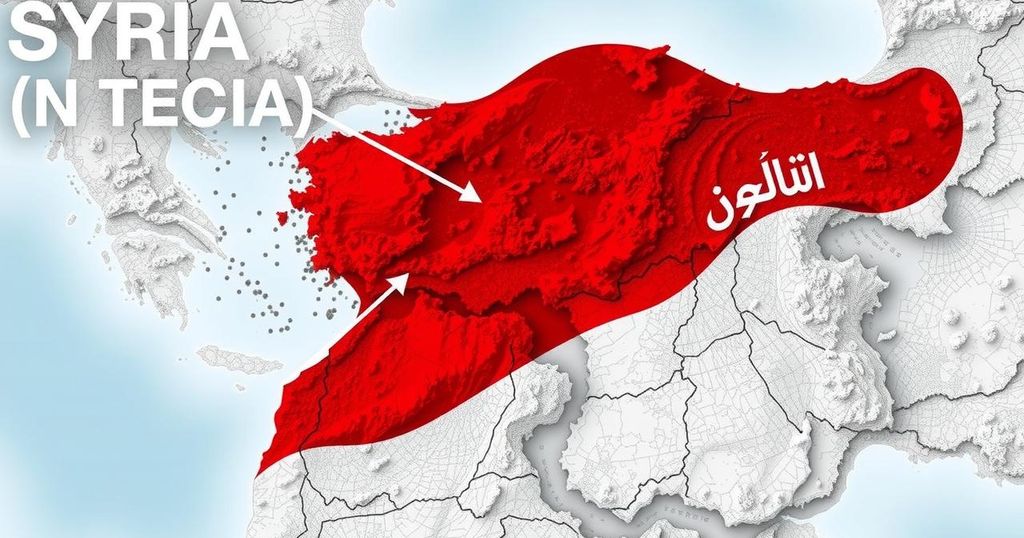Geopolitical Implications of Assad’s Ouster: The Ripple Effects to Libya
The ousting of Bashar al-Assad in Syria has triggered a strategic shift towards Libya, with Russia redirecting military assets to support Khalifa Haftar. This transition illustrates the interconnected geopolitical landscape of the Mediterranean region, demonstrating how changes in Syria influence power dynamics in Libya. The ongoing relationships and illicit networks between these regions further complicate the situation, with implications for future conflicts in the area.
The recent ousting of Syrian President Bashar al-Assad has triggered a significant geopolitical shift that reverberates through the Mediterranean, particularly affecting Libya. As reports emerged of Assad loyalists fleeing to Libya soon after his removal, the Russian military’s focus shifted toward bolstering support for Libyan commander Khalifa Haftar. Increased air traffic between Syria and Libya has been observed, alongside the movement of Russian military assets, as Moscow seeks to establish a stronger foothold in Libya amidst its diminishing influence in Syria.
With the fall of Assad, Russia faces challenges in retaining its military capabilities in Syria, leading Kremlin officials to engage with Syrian rebels. The Kremlin’s spokesman acknowledged contact with insurgents present at Russian bases, highlighting the precarious situation for Russia in maintaining its naval presence in the region. Subsequently, as Assad’s regime destabilizes, Libya’s strategic coast has become increasingly attractive for Russian naval operations.
Russia has historically benefited from its naval base in Tartus, Syria, a crucial logistical hub in the Mediterranean. However, the aftermath of Assad’s ouster raises questions surrounding the future of Russia’s military dominance in Syria and shift to Libya. Analysts suggest that this transition enhances Haftar’s leverage, potentially creating a scenario reminiscent of Assad’s earlier power structure, as both leaders were known to employ kleptocratic strategies and strong familial ties to consolidate their control.
The intricate relationships between the Haftar and Assad regimes extend to various forms of illicit networks, which have been documented in the human trafficking and drug trade. Reports indicate that Cham Wings, a Syrian airline linked to money laundering and trafficking activities, facilitated the transfer of Assad’s officials to Benghazi shortly after his downfall.
Despite the evidence of Haftar’s dealings with Russian interests, Western powers continue to engage him in hopes of fostering a unified Libyan government while maintaining regional stability. The geopolitical landscape remains fluid, with Turkey supporting the Tripoli government against Haftar’s forces, leading to a complex interplay of alliances and rivalries in Libya.
In summary, the shift in power dynamics following Assad’s removal places Libya at the center of Russian strategic interests. As military assets transfer from Syria to Libya, regional ramifications could extend beyond Libya, potentially affecting ongoing conflicts in neighboring countries.
The situation regarding Bashar al-Assad’s elimination as Syrian president marks a critical juncture in Middle Eastern geopolitics, especially concerning Libya. Russia’s vested military interests in Syria have prompted a reevaluation of its strategies, leading to an increased focus on Libya under the leadership of Khalifa Haftar. This development not only exemplifies Russia’s adaptability but also foreshadows a potential escalation of regional tensions as actors attempt to secure their interests amid shifting allegiances.
The ousting of Bashar al-Assad has catalyzed a reorientation of Russian strategic focus towards Libya. This transition highlights the interconnected nature of regional conflicts, underscoring how a significant change in one country can induce profound geopolitical shifts in neighboring regions. With the growing military presence of Russia in Libya and Haftar’s strengthened position, the dynamics of power in North Africa are likely to evolve, potentially impacting broader regional stability.
Original Source: www.france24.com




Post Comment